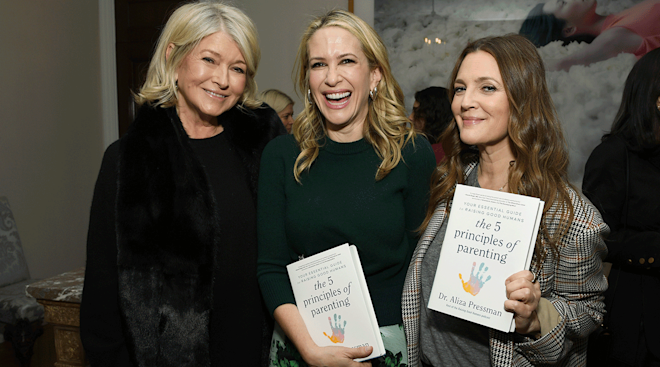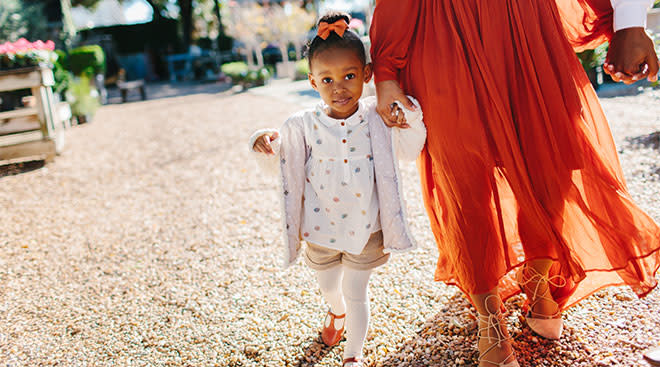How to Handle Your Emotional Threenager
Watching your kiddo’s personality emerge is incredibly exciting—but it’s not without its challenges. As little ones enter late toddlerhood and the early preschool years, many parents find their sweet babies transform into sassy and defiant 3-year-olds. Welcome to life with a threenager. But what causes this boundary-pushing shift in attitude? And how can parents get through it with their sanity intact? Read on to learn what the experts want you to know about your cheeky threenager’s emotional growth and development.
Is your hot-shot toddler acting like a petulant adolescent? It sounds like you might have a threenager. The term represents the oppositional behavior and defiance 3-year-olds can have as a way of asserting independence, says Cindy Hovington, PhD, founder of Curious Neuron, a science-backed parenting consultancy. “This is very similar to the characteristics of a teenager, hence the term.”
Curious why your threenager oscillates between blissfully happy and majorly moody? It’s all part of the childhood learning curve. Between 18 and 24 months, toddlers start to show more independence. By the age of 3, they’re better able to understand and express their ideas, personalities and emotions—but they still have very little control over them, explains Alexis Phillips-Walker, DO, a pediatrician with Memorial Hermann Medical Group Pediatrics Atascocita in Texas. This has to do with the development of the prefrontal cortex, the part of the brain behind the forehead that helps with reasoning, rational thinking, problem solving, delayed gratification, and emotional regulation, explains Hovington. These are all the cognitive skills we need to manage our feelings and behavior. That said, the prefrontal cortex doesn’t fully develop until a person is into their 20’s.
Wondering if any hormonal changes might be playing a role in your child’s behavior? Unlike teenagers, toddlers don’t go through significant hormonal shifts that affect their behavior. In fact, hormonal surges that lead to behavioral changes typically don’t happen until a child is 7 or 8 years old, says Phillips-Walker. Tantrums, defiance and asserting independence are very normal parts of child development, as kiddos at this stage are still working on the regulating skills that allow them to manage and cope with their big feelings.
This often frustrating, sometimes funny threenager phase can last for a few months or more, depending on your child and your parenting style. Hovington notes that kids start to have some executive functioning skills, like self-control and staying focused, by the age of 4 to 5, so you might notice a change around that time. That said, she cautions against “waiting it out,” and instead emphasizes the importance of staying calm, setting boundaries with sensitivity and modeling emotional regulation.
Parents of threenagers will no doubt face many emotional and behavioral challenges with their kiddos. But, as frustrating as this may be for you, know that it’s a very natural and important part of their development. “During this [phase] your child really starts to understand that their body, mind and emotions are their own,” Phillips-Walker says. “They show fear of imaginary things, care about how others act and show affection for familiar people.” What’s more, they start to recognize the difference between feeling happy, sad, scared and angry.
If you’re at your wit’s end with your threenager’s antics, know that there are steps you can take to help your child learn to cope with their feelings in healthier ways. It’ll require a lot of patience, and you may not always get it right—but that’s okay. Along with giving your little ones some grace, don’t forget to show yourself some kindness too. Below, tips on how to deal with a threenager while supporting their emotional development.
Stick to boundaries while showing compassion
Your parenting style along with how you model emotional regulation plays a big role in your child’s ability to manage their feelings and behavior. A study found that when parents react more harshly to their children (i.e. inconsistent discipline, severe punishment and constant criticism), their kids exhibit more defiant behavior. Moreover, another study demonstrated that parents who show warmth and sensitivity while setting firm boundaries see better behavioral outcomes with their children. “As difficult as it can be, it starts with us,” Hovington says. “How we respond to our child’s behavior can have an impact on how they learn to manage their emotions.”
Learn to emotionally regulate yourself first
“Emotion regulation takes lots of practice, is greatly impacted by a child’s environment (how it’s modeled by parents) and is dependent on other cognitive abilities such as inhibition and executive functions,” says Hovington. Your little one may have a behavior that triggers you, but in order to model healthy emotional regulation, it’s crucial to pause and reflect before you react. Taking time to understand the root cause of your feelings can, ultimately, help you be a calmer and more empathetic parent. And if you’re really struggling to regulate yourself, Hovington suggests starting a journal that tracks moments when you responded in ways you didn’t want to and what happened right before.
Understand your child’s “why”
Most challenging toddler behaviors have an underlying emotion, but parents often place the focus on the actions rather than the feelings driving them, explains Hovington. For example, a parent may see their child hit their sibling and discipline them without realizing the root cause of the child’s behavior is frustration. But once you’ve identified your own “why,” you’ll be able to better understand your child’s. “The more we can help soothe them and navigate these difficult behaviors, the easier it’ll be for them to learn how to soothe themselves and manage their own behaviors,” Hovington adds.
Help them describe their emotions
Helping your tot understand a wide range of words (beyond happy, sad and mad) can help them better pinpoint their feelings. And don’t be afraid to call out your own observations about how a child behaves or physically responds to their emotions. “Having conversations after an emotional outburst can help them learn how they can behave differently the next time they feel [certain] ways,” says Hovington.
Allow your child to be creative and play
Playtime allows your child to explore and express themselves. Moreover, outdoor activities also help them “explore the natural environment and learn their physical limits,” says Phillips-Walker. Creative play through arts and crafts can also provide another medium for self-expression.
Practice sharing with your child
During the threenager phase, toddlers become more interested in interacting with other kids. “They start to play cooperatively in groups of other children and start being more imaginative,” Phillips-Walker says. She suggests engaging in games that involve sharing, and teaching your child terms like, “‘Now it’s my turn to build the tower, then it’s your turn.” While sharing will still be a challenge at this age, practicing with your little one builds trust and shows them that they will get a coveted toy back once it’s their turn.
Read together consistently
According to Phillips-Walker, the threenager phase is a critical time for language development, as children begin to learn and use many new words—and they’ll closely mimic what they hear you say. Reading together not only helps kids learn more words and improve their language development, it also encourages them to use their imagination and practice foundational problem-solving skills.
Make sure your child isn’t overstimulated
Until your little one is able to properly understand, cope with and communicate their big feelings, odds are they’ll quickly become cranky when overstimulated. Pay attention to your kiddo’s environment, such as noise levels, bright lights, screen time and sleeping patterns, as well as sensory sensitivities, particularly for neurodivergent children, Hovington notes. “[All these factors] can have an impact on behavior.”
Threenagers will test their limits and push your buttons. When your little one is scraping on your very last nerve, it can be tough to model the type of emotional regulation you want to teach them. Being a threenager is hard, and it’s certainly not easy being the parent of one. Remember to be gentle with yourself, and know that your kiddo loves and needs you—and that signature attitude will soon fade.
Please note: The Bump and the materials and information it contains are not intended to, and do not constitute, medical or other health advice or diagnosis and should not be used as such. You should always consult with a qualified physician or health professional about your specific circumstances.
Plus, more from The Bump:
Alexis Phillips-Walker, DO, is a pediatrician with Memorial Hermann Medical Group Pediatrics Atascocita in Atascocita, Texas. She earned her medical degree at Ohio University Heritage College of Osteopathic Medicine in Athens.
Cindy Hovington, PhD, is the founder of Curious Neuron, a science-backed parenting consultancy that aims to make information around childhood development more accessible and digestible. She’s also the co-founder of Wondergrade, and the host of the Curious Neuron podcast. She obtained her master’s degree from Queen’s University and her doctorate in neuroscience from McGill University in Canada.
Biological Psychiatry: Cognitive Neuroscience and Neuroimaging, Harsh and Inconsistent Parental Discipline Is Associated With Altered Cortical Development in Children , Oct. 2022
Acta Paediatrica, Parenting style associations with sensory threshold and behaviour: a prospective cohort study in term/preterm infants, September 2019
Learn how we ensure the accuracy of our content through our editorial and medical review process.
Navigate forward to interact with the calendar and select a date. Press the question mark key to get the keyboard shortcuts for changing dates.





















































